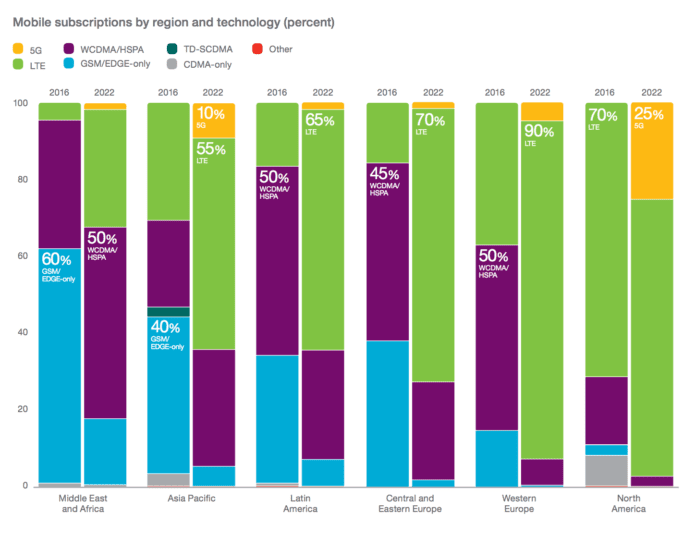Ericsson projects 500 million 5G subscriptions by 2022, but European leaders express skepticism about the pace of innovation
In a new report, Ericsson projects that North America and the Asia Pacific region will lead in 5G adoption as the technology becomes standardized and commercially deployed. In parallel, European telecommunications industry leaders have expressed concern and skepticism about Europe’s 5G ambitions as compared to regulatory reality.
In a recent open statement, six European telecom groups said that 5G-related ambitions, particularly economic enablement in vertical industries, “can only be met if the future European Electronic Communications Code and e-Privacy Regulation create the right conditions for the broad uptake of innovative services and business models. Unfortunately, discussions seem to have lost their focus on the importance of 5G as one of the key technologies that will underpin the ecosystem and the competitiveness of newly connected sectors of the European economy.
The signatories are the European Telecommunications Network Operators Association, GSMA Europe, DigitalEurope, Cable Europe, Developers Alliance and the COCIR. The groups encourage policymakers to focus on:
- A pro-investment regulatory environment;
- “Pro-innovation rules that allow the development of new business models and services across sectors and ensure that the development of IoT and machine-to-machine services is not hampered;
- Spectrum harmonization;
- “Flexible privacy requirements…”
This mood of skepticism was further reflected in comments by the CTO of Finnish network infrastructure vendor Hossein Moiin. At a press event in London, Moiin reportedly said, “I’m not optimistic about Europe to be honest. It’s kind of sad because Europe is traditionally the leader in developing technology, and it will also be this time because Nokia and Ericsson are European companies. But in terms of deployment, in terms of regulation, in terms of operator profitability and operators taking risks, these are non-technical issues, but Europe seems to be left behind,” according to Mobile World Live.
Moiin name-checked Nokia and Ericsson, two companies that are part of a very limited ecosystem of mobile network equipment providers that’s difficult to enter and could, by its nature, stymie 5G innovation coming out of academia and the startup community.
Despite some pessimism, Ericsson, in its most recent Ericsson Mobility Report, projects there will be some 500 million 5G subscriptions around the world by 2022. In terms of 5G adoption, Ericsson predicts North America and the Asia Pacific region will lead the way, followed by Europe.

